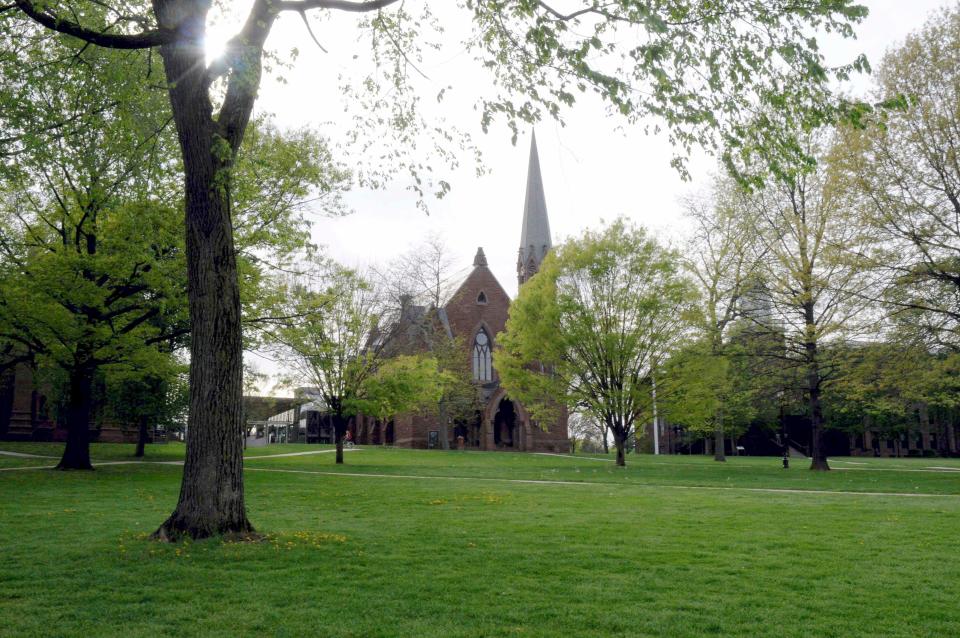1 Louisville college among those in KY who consider legacy admissions for enrollment
- Oops!Something went wrong.Please try again later.
Legacy admissions are under scrutiny after the undoing of affirmative action in college admissions. New data show, for the first time, how widespread the practice may be.
Nearly 600 colleges consider whether applicants' parents, siblings or other relatives attended the institution to which they are applying, according to data published Tuesday by the National Center for Education Sciences.
The 579 colleges identified by an NCES survey said that as of fall 2022, they considered whether college hopefuls had a familial link to their respective institutions. That was about a third of the more than 1,900 schools in the survey with so-called competitive admissions — colleges where students cannot simply enroll and start taking classes. NCES said it was the first time it has collected information on the practice.
Legacy admissions are often associated with the nation's most elite universities, such as the Ivy League. Though NCES didn't name which colleges responded yes, the number who did so indicates the practice extends far beyond top-tier schools.
A search of the federal database on higher education shows those that said they would consider legacy admissions — though it's unclear how often it is considered or how many students are admitted because of it — include Flagler College in St. Augustine, Florida; the State University of New York at Potsdam; and Spelman College, a historically Black private school for women in Atlanta.
Which Kentucky schools consider legacy admissions?
The data also show six schools in Kentucky consider legacy admissions.
The institutions in the state include:
Ashbury University
Centre College
Kentucky Christian University
Murray State University
Transylvania University
Simmons College of Kentucky
Within the legacy status for each school, it states that being a legacy is not required for admission, however, the U.S. Secretary of Education says that knowing that status of legacy applicant is necessary.
"Access to data on legacy applicants is essential for colleges and universities reevaluating their admissions practices and working to build diverse student bodies in the wake of the Supreme Court’s disappointing ruling on affirmative action earlier this year," Education Secretary Miguel Cardona said in response to the findings.
Who benefits from legacy admissions?
In that ruling, on cases filed against Harvard and the University of North Carolina, Justice Neil Gorsuch questioned Harvard's use of legacy admissions in a concurring opinion, pointing out who they are most likely to benefit.
"Its preferences for the children of donors, alumni, and faculty are no help to applicants who cannot boast of their parents' good fortune or trips to the alumni tent all their lives," Gorsuch wrote. "While race-neutral on their face, too, these preferences undoubtedly benefit white and wealthy applicants the most."
A 2019 analysis conducted on behalf of the plaintiffs in the Harvard and UNC cases found 43% of Harvard’s white admissions were legacy students, recruited athletes, children of faculty and staff or applicants affiliated with donors.

Shortly after the ruling, a civil rights group filed a federal complaint against Harvard with the Education Department over the practice. The agency opened an investigation in response.
Some colleges have declared they will no longer consider applicants' relationship to their institutions, however. For instance, the University of Virginia said it will do away with an option on its application for students to indicate personal or historic relations with the university. Others that changed their policies over the past few years include Amherst College, the University of Minnesota and Wesleyan University.
More: After Supreme Court ruling on affirmative action, college counselors shift strategy
Contributing: Chris Quintana
This article originally appeared on Louisville Courier Journal: Legacy admissions considered at hundreds of colleges, even in Kentucky

